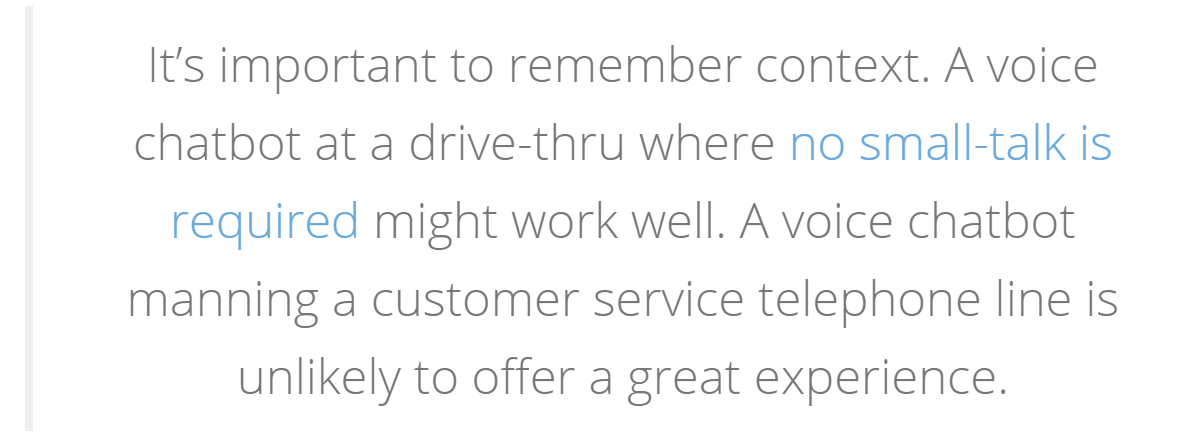Chatbots have become very popular for their ability to save time and resources by automating customer services. At VOIZ, we believe that chatbots can be used to address common and simple customer queries and inquiries, allowing their human counterparts to focus on solving more complex matters. As discussed earlier, chatbots and agents tend to complement each other. Doing so has resulted in a lot of companies being able to lift boost customer retention, enhance productivity, increase customer referrals and facilitate a better customer experience.
What is the current scenario with Chatbots and Human agents?
Gartner predicted that 85% of customer interactions will be managed without humans in 2021. While this is highly debatable and hasn’t been rightly predicted; the notion of the replacement of humans with chatbots is a scary notion for customers who tend to prefer human interaction over a robotic one. It is also an unpleasant notion for agents or CX talent who are sensitive to the security of their CX jobs.
We are here to tell you human agents are not going anywhere. Why? Because the call centre is still inherently a remote CX platform or a forum for human interaction and engagement. The predicted 85% of interactions that can be offloaded from human customer support agents will be represented by customers’ common questions and repeat issues that tend to sap agent productivity. Imagine the additional productivity companies can derive from their agents when they are not chasing down these pesky and mundane undertakings.

This goes back to cement the fact that the reality of chatbots and human agents lie in their harmonious coexistence with one another as bots are meant to complement their human counterparts not replace them. Virtual agents and chatbots have the capacity to become chief spokes on the CX wheel that is anchored by human agents. So now that it has been established that chatbots free up customer support (CS) agents from having to answer frequently asked questions allowing agents to fully focus on customers with complex problems and cumbersome topics. Used right, the combination can help enhance the operational performance metrics and KPIs like NPS and CSAT Regardless, according to a study conducted by Genesys, customers overwhelmingly opt to speak to human agents.
What do customers really think about Chatbots?
Chatbots aren’t new anymore. They have been around for a long time and when done right customers can find them to be quick, helpful and easy to use. TechRepublic reports that more than half the total consumer population would prefer to take their customer service issues to a human agent rather than a chatbot if given the choice. The report goes on to reveal that 70% are open to receiving assistance from a chatbot when it comes to straightforward issues and problems. 51 % of consumers are willing to limit their interaction with chatbots to simple issues.
When it comes to personalization and politeness, good old-fashioned human support takes the front seat. 62% of respondents in TechRepublic’s study think that human agents are more polite than their robotic counterparts. When it comes to privacy, customers face a lot of concerns when it comes to doing business with chatbots. According to a study conducted by PWC, 28% of consumers worry about the privacy and security of their sensitive data and the safety of using bots or voice assistants. 45% of customers have gone on to say that they are uncomfortable about sending payment through bots. Analyst agency CGS reported that 68% of consumers would not trust their personal information and data with a chatbot. Thus proving that chatbots may have their uses but humans are very much essential in building and maintaining trust.
Userlike conducted a detailed study to gain insight into how respondents or customers felt about using chatbots and/or interacting with human agents. Some of the findings are as follows:
- 80% of the respondents have previously interacted with a chatbot
Source: Userlike
Out of the 415 respondents, 333 consumers responded saying they have had the experience of interacting with a chatbot.
Source: Userlike
About 75% of respondents have never interacted with a chatbot simply because they have always wanted to interact with a human agent and want no other alternative.
- Most customers prefer to wait for an agent but are open to chatting with a bot in the interim
Source: Userlike
If customers are given the option, more than half of them responded saying they wouldn’t mind interacting with a chatbot initially, in order to be eventually transferred to a live human agent.
Source: Userlike
60% of respondents responded that they would prefer to wait in queue if it meant that they could speak with a human support representative.
- Customers trust bots with basic and uncomplicated requests and questions
Source: Userlike
Customer support representatives answer a lot of repeatedly asked questions and queries which can be easily outsourced to a chatbot. As per the study, customers don’t mind quizzing chatbots if the request or query is uncomplicated and not urgent.
When it comes to simple questions and uncomplicated matters, some customers are willing to interact with a chatbot. According to statistical data, 30% of respondents would use it to pay a bill and at least 54% of respondents would use a chatbot to ask about a product or service. Only 23% of customers responded saying they would settle complex disputes through chatbots.
- The respondents agree that chatbots are convenient and fast but have their limitations
Source: Userlike
Respondents agreed that chatbots are quick, accessible and convenient to use but they also said that bots do not comprehend their requests or query most of the time, therefore, found it unable to resolve even the simplest queries or issues.
- A small percentage of respondents think a business or company should not use a chatbot at all
Source: Userlike
9% of the respondents responded by saying that companies shouldn’t use a chatbot at all and must fully hire a CX team or hire CX agents for the job.
Give your customers what they want by ‘staying human’
True, it does depend on the customer and the particular service situation. While many sing praises of chatbots, many are put off at the thought of having to use them. The Drift and SurveyMonkey Audience 2019 State of Conservational Marketing report stated that, though chatbots are preferable to other digital channels of communication, customers prefer to speak to a live human agent the most for a variety of reasons including ease of communication, imparting of emotions, convenience, and great consumer experience.
Given what we know about how people prefer to interact and communicate with customer service, a blended approach can be effective. IBM stated that chatbots help to reduce service costs by 30%. Chatbots cannot replace human agents but they certainly can help take the load off of them. Customer service automation is a phenomenal resource support team but human resources are an essential part of the equation. Bots can be implemented to handle simpler and more frequent customer queries and requests whereas human agents can focus more on complex matters instead of wasting time on trivialities. A chatbot can on do so much and is no substitute for the empathy and trust a genuine human connection provides.

